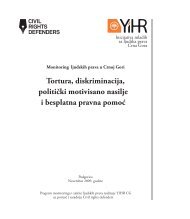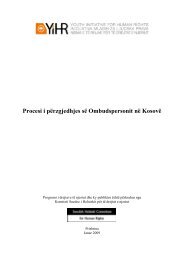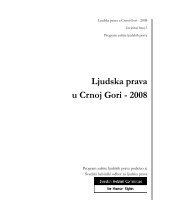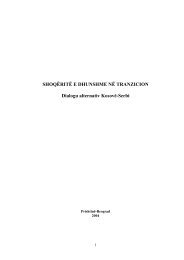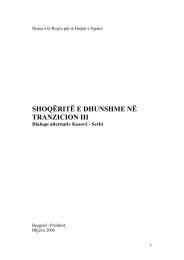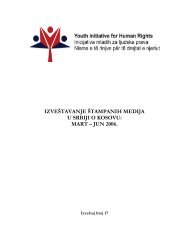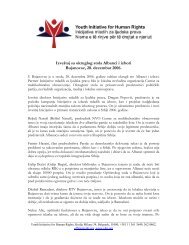Implementation of Transitional Laws in Serbia 2006
Implementation of Transitional Laws in Serbia 2006 - Archive
Implementation of Transitional Laws in Serbia 2006 - Archive
- No tags were found...
You also want an ePaper? Increase the reach of your titles
YUMPU automatically turns print PDFs into web optimized ePapers that Google loves.
<strong>Implementation</strong> <strong>of</strong> <strong>Transitional</strong> <strong>Laws</strong> <strong>in</strong> <strong>Serbia</strong> <strong>2006</strong>would advance at greater pace if they had more guardians <strong>in</strong> Belgrade” that“they seem to have only now become acqua<strong>in</strong>ted with the use <strong>of</strong> soap”, and“they used to stick their teeth <strong>in</strong> unpeeled lemon.” Both proceed<strong>in</strong>gs areunderway, and court rul<strong>in</strong>gs are expected by the end <strong>of</strong> the year.The relation between police members and <strong>Serbia</strong>n citizens is largelycharacterized by torture that is, molest<strong>in</strong>g, tortur<strong>in</strong>g, <strong>in</strong>flict<strong>in</strong>g harmfulpsychic and physical <strong>in</strong>juries, violation <strong>of</strong> one’s jurisdictions andunconscientiously work. It <strong>of</strong>ten happens that <strong>Serbia</strong>n citizens who arevictims <strong>of</strong> police torture are accused for “disrupt<strong>in</strong>g an <strong>of</strong>ficial person <strong>in</strong>execution <strong>of</strong> security affairs” 772 . This is a k<strong>in</strong>d <strong>of</strong> preventive action, afterthe torture, so as to justify the use <strong>of</strong> force by police <strong>of</strong>ficers, which iswitnessed by victims’ medical documentation. The police <strong>of</strong>ficers whoparticipated <strong>in</strong> torture always have support <strong>of</strong> their superiors, but also <strong>of</strong>judges <strong>in</strong> these procedures.The monitored human rights <strong>in</strong> <strong>Serbia</strong> are <strong>of</strong>ten violated and there is noadequate reaction <strong>of</strong> authorized <strong>in</strong>stitutions that would br<strong>in</strong>g to courtpunishment <strong>of</strong> responsible persons. By creat<strong>in</strong>g a no-punishment traditionfor violation <strong>of</strong> human rights <strong>of</strong> <strong>Serbia</strong>n citizens, all perpetrators <strong>of</strong> thesecrim<strong>in</strong>al acts are encouraged to cont<strong>in</strong>ue their practice <strong>in</strong> the future andpreventive element that every legal sanction should have is thereby lost.This attitude <strong>of</strong> judicial bodies <strong>in</strong> <strong>Serbia</strong> toward perpetrators and victims <strong>of</strong>violated human rights does not contribute to the development <strong>of</strong> the rule<strong>of</strong> law <strong>in</strong> <strong>Serbia</strong> and creation <strong>of</strong> a democratic, civil, open and responsiblesociety, which <strong>Serbia</strong> declaratively hopes to become.This report was written on the basis <strong>of</strong> <strong>in</strong>formation collected untilNovember <strong>2006</strong>.772 The Law on public order and peace (Official Gazette <strong>of</strong> RS, number 51/92, 53/93, 67/93, 48/94), Article23, item 1142



